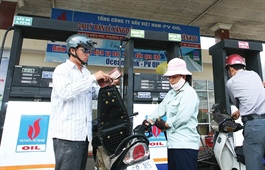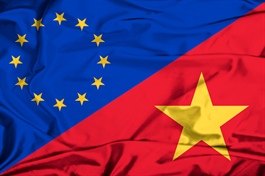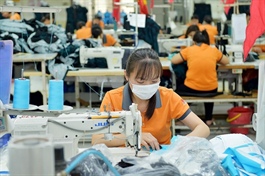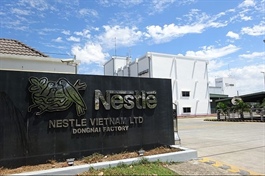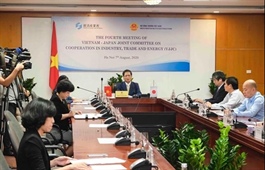South Korean tech titans tracking cost advantage
South Korean tech titans tracking cost advantage
Recognising the vast potential of Vietnam’s developing IT industry, more South Korean high-tech tech firms are looking to ramp up their production in the Southeast Asian country.
|
LG Electronics is developing a new R&D centre in Vietnam
|
World-famous Samsung Electronics is reported to plan to move its PC production from China to Vietnam to lower costs and stay competitive in the PC business. The company could close its factory in China as soon as this month and convert part of the facility into a research and development (R&D) centre. A spokesman said the move to shut the Chinese plant was based on the need to find a cost advantage.
Meanwhile, LG Electronics is developing a new R&D centre in Vietnam as part of efforts to expand its presence in the market. During a recent meeting between Prime Minister Nguyen Xuan Phuc and South Korean companies, LG reportedly confirmed the plan. The company already has an R&D centre focused on its vehicle component solutions business in Hanoi. LG said it is currently looking for potential sites in Vietnam but it has yet to confirm detailed plans.
According to the Korea Chamber of Business in Vietnam (KorCham), Vietnam’s great potential in IT and workforce of related engineers has attracted not only Samsung and LG but also many others.
IT recruitment firm TovDev in Ho Chi Minh City said that South Korean IT companies are planning to come to Vietnam, and they “wish to give the IT talents in Vietnam the opportunity to experience an international and professional working environment to maximise their careers.”
Commenting on this trend, Linda Liu, an economist at Maybank Kim Eng, told VIR that the recent wave of multinational corporations carrying out investments in Vietnam underscores the view that Vietnam continues to position as a major beneficiary of the manufacturing supply chain shift.
South Korea remains by far the largest foreign investor in Vietnam. Data from Vietnam’s Ministry of Planning and Investment (MPI) showed that as of July 20, the total registered investment capital from South Korea in Vietnam amounted to more than $70 billion, accounting for 18.4 per cent of total overseas registrations in Vietnam.
This is followed by Japan and Singapore, with the total registered investment capital into Vietnam at $60.22 billion and $55 billion, respectively.
“Recent news of South Korean investors building R&D facilities in Vietnam like Samsung and LG are positive signs that Vietnam could be gradually moving up the value chain and attracting more high-quality foreign investments,” Liu said. “This is in line with Vietnam’s new foreign direct investment (FDI) attraction strategy towards 2030 announced late last year, whereby more focus is expected to be placed on attracting FDI in high-tech and environmentally-friendly sectors in the coming decade.”
That said, the supply chain shifts towards Vietnam are still likely to occur in a more step-by-step approach, meaning starting with mid-end and simpler product lines such as electronic components and parts, before upgrading to more complex and sophisticated high-tech products.
Dean Rolfe, partner and head of Market Entry at KPMG in Vietnam, told VIR that one of the causes driving this new high-tech investment into Vietnam is nothing more than a diversification away from China. He added semiconductor sales to China may slow and this might have an impact on high-tech manufacturing from this nation, especially products which are destined for international markets and not internal consumption.
“As a consequence, many enterprises might be looking at a diversification strategy away from China or as a supplemental China+1 strategy. Other enterprises might be seeking cost reductions, while others might be looking at building entirely new high-tech supply chains for products in new geographic locations to reduce cost and widen geographic diversification,” he said.
Kim Heung Soo, chairman of the Korean Chamber of Commerce and Industry, told VIR that South Korean investment in Vietnam has traditionally been concentrated on the manufacturing industry such as garments, bags, and footwears. However, recently Korean companies’ investment in Vietnam has also been diversifying into high value-added high-tech industries. Besides Samsung and LG, some of the leading companies that actively invest in the industry are Hyosung, SK, and Hyundai Motors.
“However, for Vietnam to develop into an R&D hub, the foundation of the related technology industry must be solid first, and the Vietnamese government needs to actively train a professional workforce. Additionally, there should be preferential benefits such as visa and tax incentives to secure foreign professionals,” Soo said.
Echoing this view, Michael Han, head of SK Group’s representative office in Vietnam, said that it would be a win-win situation for South Korean firms and Vietnam’s economy if more incoming investments are made into high value added industries.
Despite COVID-induced challenges, the economy has endured well compared to some of its peers. But pandemic aside, Han says Vietnam’s economy needs to upgrade its growth drivers and inducement of such investments can definitely help.
“I personally have been taking note of series of announcements on South Korean R&D investments into Vietnam, which was quite encouraging to see,” Han said.
“Yet, the true benefit for Vietnam can only be meaningful if such R&D investments become a continuous trend, rather than being one-offs. And especially for R&D of higher value added industries, I think the government’s coordinated support is quite vital.”







